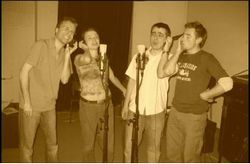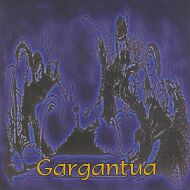
Gargantua is a Polish avant-garde band who has got a pretty big following.
I got in touch with the band for their story and Bartek answered my questions.
#################################################################
When, where and by whom was Gargantua started ? Did any of you, past
and present Gargantua members, play in any other bands before joining
up in Gargantua ? Why did you choose that name ?
The band was founded by me and my high school
friend Justyn Hunia some time around 1995-1996.
Originally the band was called Gollywog, however, a year or two later
we learned this word had a racist overtone, so we decided to change
it to Gargantua – the new name also started with G, plus naturally
had interesting artistic and literary implications. We had never
played in any other band – before setting up Gollywog during our
high school years I regularly met with Justyn at my home to rehearse.
After a while we decided to form a band and via a friend we got in
touch with Marcin Borowski, who turned out to be our long-standing
drummer and a great guy. As far as I remember Marcin had played in
some obscure teenage heavy-metal band. The last player to form the
first line-up of Gargantua was a bass player Leszek Mrozoski –
interestingly his musical experience amounted to playing in a village
weeding band!

Over to your albums. Your debut album was
Gargantua from 2003. Please tell us more
about this album.
Our debut album was a result of a few years’
evolution and artistic development from
what now seems to us somewhat bombastic, long-winded 80s-style
progressive rock with long guitar and keyboard solos to less more
mature and concise forms with syncopation, intriguing rhythmic
structures and ambitious lyrics. It appeared at the independent
Polish label Ars Mundi in 2003.
The album was quite well received – we got
invited to a few radio programs and got positive reviews on the web
in Poland and abroad, which was a success given the fact that we
never ever played live after the album’s release.
Your second album was Kotegarda from 2007. Please tell us more about
this album.
Following the
release of our first album Justyn Hunia, who played the keyboard and
wrote lyrics, decided to leave the band and by happenstance I managed
to enlist two professional musicials – Tylda Ciołkosz (Cashmere,
Quidam), violinist, and Paweł Kubica – one of Poland’s most
talented classical pianists of his generation, who performed at
famous festivals of classical and modern music, such as International
Frederic Chopin Piano Competition. Now that we had new instruments
obviously immensely impacted the way we sounded, and a biggest
novelty was the violin that was given the prominence.
First days of the
new line-up were a bit of an uphill struggle – new Gargantua
members we bewildered seeing how we, self-taught musicians,
communicate with each other using strange caveman-like gestures and
sounds to explain our musical ideas. It seemed that things will not
work out, but I kept encouraging all band members to just do their
part because in the end we’ll arrive at something interesting. And
though even I had serious doubts, somehow we managed to form a
well-integrated collective. In pieces such as Interferometr
or Triple Ratamaklie I didn’t fully realize who has a leading line
and it took me a lot of time – and beers – to finally settle with
our sound engineer Slawek Biela who is to be on top when.
The
result of there struggles was our second album, Kotegarda.
We released it under our own label to have a fully control of our
work and activity. This album is less progressive and shows echoes of
the RIO tradition and some modern music inspirations, as evidenced by
our arrangement of Igor Stravinski’s part of Rite of Spring).
Unlike our first album, Kotegarda is almost completely instrumental
and features meticulously thought-out compositions that use
techniques traditionally associated with jazz and chamber music
(dissonance, frequent changes of odd rhythms, polyrhythms, mixed
meters, unorthodox harmonies, altered chords and polyphony). Careful
listener will detect affiliations with contemporary music rock
(Stravinski, Reich) and rock experimentation (Fripp, Frith, Univers
Zero). On the musical level Kotegarda offered dense polyphonic
structures interwoven with frivolous, “mock-heroic” tunes. All
this morphed into either jagged interplay of guitar and replicated
violin, or irreverent choral enunciations, electronic soundscapes and
piano staccatos.
What have you been up to since the release of that album?
In the meantime Poland joined EU and our
long-standing drummer, Marcin Borowski decided to seek job
opportunities in the UK, where he lives until today. This put a spoke
in our wheel and as a result we never played a live gig since this
release. I tried rehearsing with some new musicians but that has been
on an irregular basis. Recently however we
received an invitation to play at the September 2011 edition of Rock
in Opposition festival in France and we are considering the
“yes”-option.
How is the creative processes in Gargantua from coming with ideas to
putting them into records ?
Basically each band member puts forward some
interesting idea and the rest of us make
sure to mangle it so it would sound as weird as possible:-)
For those of us unknown with your music; how would you describe you
music and which bands would you compare yourself with ?
I see our music as an eclectic mix of
avant-progressive rock, RIO tradition, jazz
and contemporary music.
What is the latest update and your plans for this year and beyond ?
At the moment I treat Gargantua as a disbanded
army that will be recalled to action when the need
arises. In what lineup – that is an unknown here, but we have to go
forward and I’ve been toying with the idea of adding bass clarinet.
To wrap up this interview, is there anything you want to add to this
interview ?
Open your ears my
friends and listen to Kotegarda very loud!
Thank you to Bartek for this interview
Their PA profile is here and their homepage's here
/PAlogo_v2.gif)


